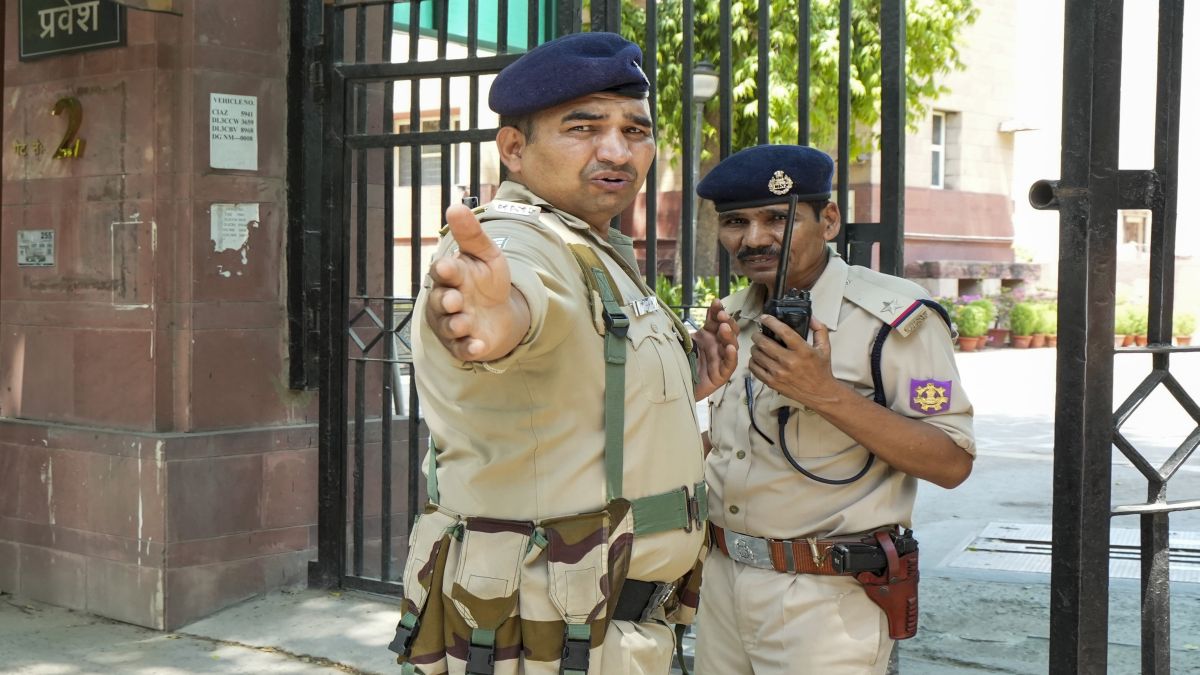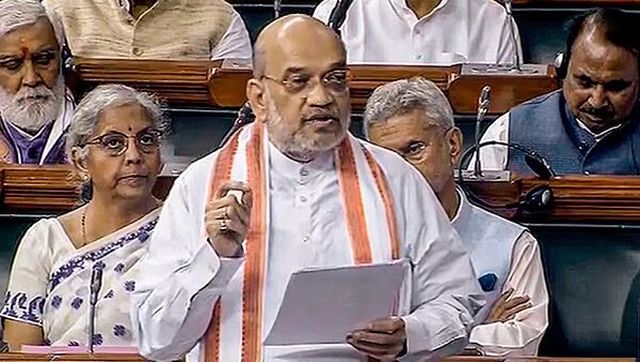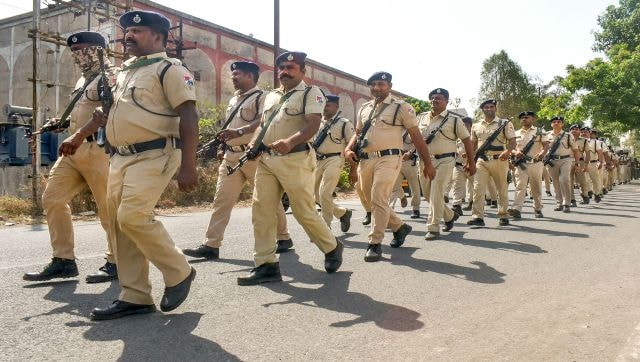)
Passed in Parliament last December, India’s three new criminal laws — Bharatiya Nyaya Sanhita, Bharatiya Nagarik Suraksha Sanhita, and Bharatiya Sakshya Adhiniyam — take effect today (July 1). The new legislation brings about several changes to the criminal reform system and vows to focus on providing speedy justice to all read more
Advertisement)
Police personnel outside the National Museum in New Delhi. The three new criminal laws -- The Bharatiya Nyaya Sanhita, Bharatiya Nagarik Suraksha Sanhita and the Bharatiya Sakshya Adhiniyam -- take effect, starting today. File image/PTI
India’s criminal justice system, starting today (July 1), will see a major overhaul as three new criminal laws, Bharatiya Nyaya Sanhita (BNS), Bharatiya Nagarik Suraksha Sanhita (BNSS), and Bharatiya Sakshya Adhiniyam (BSA) will replace the colonial-era Indian Penal Code (IPC), Code of Criminal Procedure (CrPC), and Indian Evidence Act, respectively.
The new laws were passed by Parliament last December, with Home Minister Amit Shah, who had piloted the change, saying that the legislations would give priority to providing justice, unlike the British-era laws that gave primacy to penal action. “These laws are made by Indians, for Indians and by an Indian Parliament and marks the end of colonial criminal justice laws,” he said.
AdvertisementShah said the laws were not just about changing the nomenclature but bringing about a complete overhaul. “Soul, body and spirit” of the new laws is Indian, he said.
As the new laws are introduced in the country, all 17,500 police stations across the nation will hold a special event involving women, youth, students, senior citizens and eminent personalities to apprise them of the key features of the new criminal laws, which will come into force on that day.
So what changes with the new laws? Here are some key takeaways.
The Bharatiya Nyaya Sanhita
The Bharatiya Nyaya Sanhita (BNS) replaces the 163-year-old Indian Penal Code and brings about significant changes in the criminal justice system. Compared to the IPC, which had 511 sections, the BNS has 358 sections.
The BNS has also introduced a handful of new offences — as many as 21. One of the significant ones is penalising sexual intercourse through the employment of “deceitful means”. The law reads: “Whoever, by deceitful means or by making promise to marry to a woman without any intention of fulfilling the same, has sexual intercourse with her… shall be punished with imprisonment” of up to 10 years, and also be liable for a fine.”
The new law also addresses deceit, encompassing false promises related to employment, promotion, or marriage by concealing one’s identity.
AdvertisementThe BNS also recognises murder on the ground of race, caste, or community as a separate offence. Moreover, organised crime and terror offences have been defined and covers a broad spectrum of activities. These include kidnapping, robbery, vehicle theft, extortion, land grabbing, contract killing, economic offences, cyber-crimes, and trafficking in persons, drugs, weapons, or illicit goods or services. Human trafficking for prostitution or ransom, conducted by individuals or groups acting in concert, as members of organised crime syndicates or on behalf of such syndicates, will face severe penalties. These crimes, executed through violence, threats, intimidation, coercion, or other unlawful means for direct or indirect material gain, will be met with stringent punishment.
AdvertisementThe BNS defines a terrorist act as any that threatens the unity, integrity, sovereignty, or economic security of India with the intent to strike terror among people.
Mob lynching also finds a mention in the new law. It states, “When a group of five or more persons acting in concert commits murder on the ground of race, caste or community, sex, place of birth, language, personal belief or any other similar ground, each member of such group shall be punished with death or with imprisonment for life, and shall also be liable to a fine.”
The BNS also introduces community service as a form of punishment. However, the exact nature of this punishment hasn’t been clarified.
Advertisement
Bharatiya Nagarik Suraksha Sanhita, explained
The Bharatiya Nagarik Suraksha Sanhita (BNSS), which replaces the Criminal Procedure Code (CrPC), deals with procedural law. The BNSS has 531 sections compared to the 484 in the CrPC.
Home Minister Amit Shah had earlier said that the BNSS takes a victim-centric approach by bringing in tighter timelines for the completion of trials. Hence, judgment in criminal cases has to come within 45 days of completion of trial and charges must be framed within 60 days of first hearing. Also, medical experts examining rape victims must submit their reports to the investigating officer within seven days.
A notable change in the BNSS is the number of days that a person can be kept in police custody. Now, a person can be kept in police custody for 90 days compared to CrPC’s 15-day limit.
AdvertisementTrials in absentia — wherein an accused can be tried and convicted in his absence — has also been introduced in the BNSS. The BNSS also removes statutory bail for an accused, if he/she has more than one offence against their name.
The BNSS also allows for the filing of a ‘Zero FIR’, wherein a person can file a First Information Report (FIR) at any police station, regardless of jurisdiction. Interestingly, under the new law, in the event of an arrest, the individual has the right to inform a person of his choice about his or her situation. This will ensure immediate support and assistance to the arrested individual.
Under the BNSS, summons can be served electronically. It also mandates all state governments to implement the Witness Protection Scheme.

All about Bharatiya Sakshya Adhiniyam
The Bharatiya Sakshya Adhiniyam (BSA) replaces the Indian Evidence Act and introduces changes in the way evidence is processed. The BSA allows for “electronic and digital records”. This covers a wide range of electronic records, which includes emails, server logs, files stored on computers, laptops, or smartphones, website content, location data, and text messages, among others.
The BSA also allows for oral evidence to be taken electronically. Additionally, to provide more protection to the victim and enforce transparency in investigation related to an offence of rape, the statement of the victim shall be recorded through audio-video means.
The BSA has also expanded “secondary evidence” to include oral and written admissions. It states that secondary evidence will include “evidence of a person who has examined a document, the original of which consists of numerous accounts or other documents which cannot conveniently be examined in Court, and who is skilled in the examination of such documents”.
With inputs from agencies